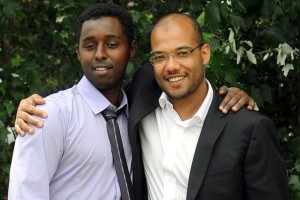CALD communities at risk from miscarriages of justice
People from newly emerging culturally and linguistically diverse communities are much more vulnerable to become the victims of miscarriages of justice that the general population, according to eminent lawyer Kimani Boden.
“I think definitely people from CALD communities are at greater risk especially where financial resources are an issue,” he said.
“It costs a lot of money to brief a QC in a criminal case and many people can’t afford this. And if you have QC on your side, it’s a totally different sort of thing,” Mr Boden said.
Mr Boden defended Somali-born Farah Jama, who served 15 months in prison for an alleged 2006 rape after he was convicted solely on contaminated DNA evidence.
Mr Jama was convicted of raping a 40-year-old woman at a Melbourne nightclub in 2008 despite having an alibi and no witnesses to the alleged crime.
Mr Boden said the case was an example of the issues people from disadvantaged communities faced when confronted with the criminal justice system.
He said prejudice and stereotyping could play a role in miscarriages of justice.
“That sort of prejudice in the Jama case led to fatal errors and a lack of analysis that in turn led to a comedy or errors,” Mr Boden said.
“The only evidence in the case was DNA evidence and that blinded everyone to the fact that none of the other evidence fitted the circumstances,” he said.
“There was a she’ll be right attitude on the part of the prosecutors. But in the criminal justice system there is no room for laziness.
“In a criminal case someone’s future is at stake and the consequences can be very serious,” Mr Boden said.
In the Jama case, even the alleged victim couldn’t place Mr Jama at the scene because she was unconscious during the alleged encounter.
An inquiry conducted by former Victorian Supreme Court judge Frank Vincent held after Mr Jama was jailed found the case should have never gone to court.
Police and prosecutors all failed to see that the facts pointed to Mr Jama’s innocence and were blinded by the “mystical infallibility” of DNA evidence, Justice Vincent’s report found.
It emerged after Mr Jama’s conviction that a DNA sample collected from the woman had been contaminated with DNA taken in an unrelated test the day before that involved Mr Jama’s DNA.
No charges stemmed from the other test and it is unknown exactly how the contamination occurred.
Justice Vincent said the Jama case was based on one piece of evidence that was at odds with everything else known about the matter.
“In the Jama case the prosecution effectively said ‘we do not know how or where the alleged rape could have occurred – we have no scenario to offer’.
“But they presented one piece of DNA evidence that was in direct conflict with everything else otherwise known.
“I have grave doubts the current trial by jury system is capable of evaluating that type of evidence. We need new processes in respect of the way we handle scientific or medical evidence: a reserve mechanism able to look again at criminal convictions,” Justice Vincent said.
Mr Jama received $550,000 in compensation after he was acquitted.
“Nobody will understand the pain that I went through,” Mr Jama said after the report was released.
“They jailed me for no reason,” he said.
A new program launched in Melbourne last month will review potentially unsafe criminal convictions.
The ‘Bridge of Hope Innocence Initiative at RMIT’ is a collaboration between staff, students and industry which aims to re-examine cases where a person may have been wrongfully convicted.
The initiative will assist, where possible, in exonerating clients if there is evidence they have been wrongfully convicted.
The innocence initiative is a joint venture between RMIT University and The Bridge of Hope Foundation. It is based on the work of other organisations in the global innocence movement, which aims to both investigate claims of wrongful conviction and campaign for reform of issues that lead to these injustices.
Laurie Nowell
AMES Australia Senior Journalist













